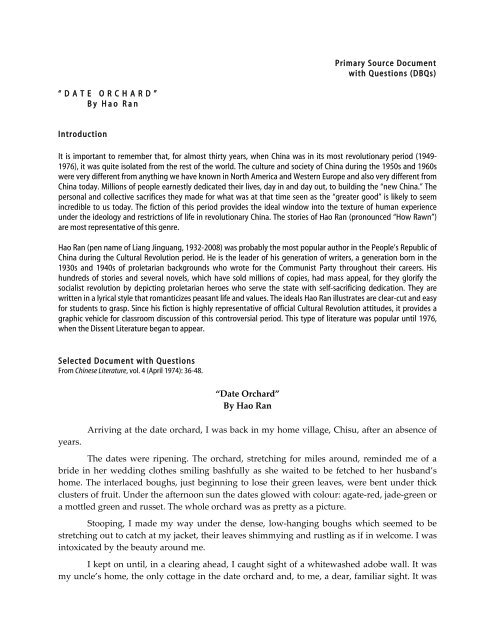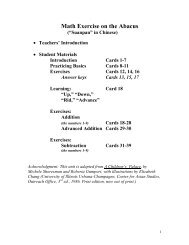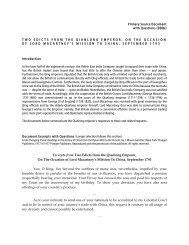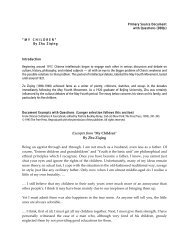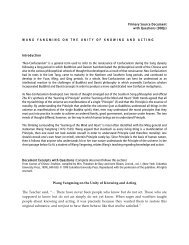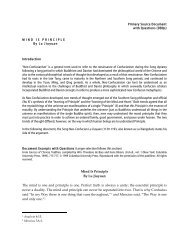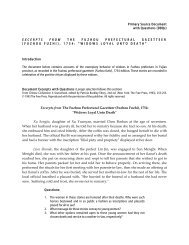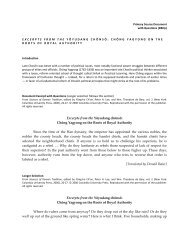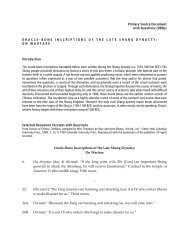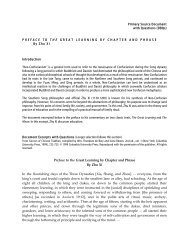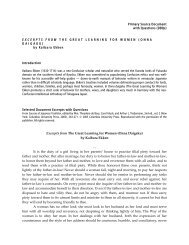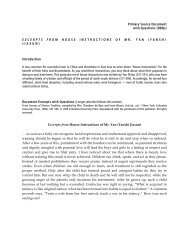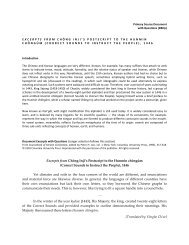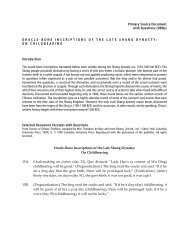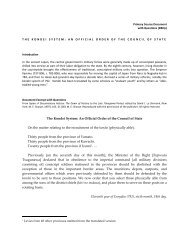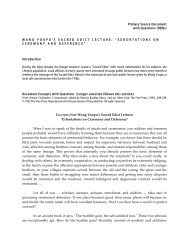DATE ORCHARD - Asia for Educators - Columbia University
DATE ORCHARD - Asia for Educators - Columbia University
DATE ORCHARD - Asia for Educators - Columbia University
You also want an ePaper? Increase the reach of your titles
YUMPU automatically turns print PDFs into web optimized ePapers that Google loves.
Primary Source Document<br />
with Questions (DBQs)<br />
“ <strong>DATE</strong> <strong>ORCHARD</strong>”<br />
By Hao Ran<br />
Introduction<br />
<br />
It is important to remember that, <strong>for</strong> almost thirty years, when China was in its most revolutionary period (1949-<br />
1976), it was quite isolated from the rest of the world. The culture and society of China during the 1950s and 1960s<br />
were very different from anything we have known in North America and Western Europe and also very different from<br />
China today. Millions of people earnestly dedicated their lives, day in and day out, to building the “new China.” The<br />
personal and collective sacrifices they made <strong>for</strong> what was at that time seen as the “greater good” is likely to seem<br />
incredible to us today. The fiction of this period provides the ideal window into the texture of human experience<br />
under the ideology and restrictions of life in revolutionary China. The stories of Hao Ran (pronounced “How Rawn”)<br />
are most representative of this genre.<br />
Hao Ran (pen name of Liang Jinguang, 1932-2008) was probably the most popular author in the People’s Republic of<br />
China during the Cultural Revolution period. He is the leader of his generation of writers, a generation born in the<br />
1930s and 1940s of proletarian backgrounds who wrote <strong>for</strong> the Communist Party throughout their careers. His<br />
hundreds of stories and several novels, which have sold millions of copies, had mass appeal, <strong>for</strong> they glorify the<br />
socialist revolution by depicting proletarian heroes who serve the state with self-sacrificing dedication. They are<br />
written in a lyrical style that romanticizes peasant life and values. The ideals Hao Ran illustrates are clear-cut and easy<br />
<strong>for</strong> students to grasp. Since his fiction is highly representative of official Cultural Revolution attitudes, it provides a<br />
graphic vehicle <strong>for</strong> classroom discussion of this controversial period. This type of literature was popular until 1976,<br />
when the Dissent Literature began to appear.<br />
<br />
Selected Document with Questions<br />
From Chinese Literature, vol. 4 (April 1974): 36-48.<br />
<br />
“Date Orchard” <br />
By Hao Ran <br />
<br />
Arriving at the date orchard, I was back in my home village, Chisu, after an absence of <br />
years. <br />
The dates were ripening. The orchard, stretching <strong>for</strong> miles around, reminded me of a <br />
bride in her wedding clothes smiling bashfully as she waited to be fetched to her husband’s <br />
home. The interlaced boughs, just beginning to lose their green leaves, were bent under thick <br />
clusters of fruit. Under the afternoon sun the dates glowed with colour: agate‐red, jade‐green or <br />
a mottled green and russet. The whole orchard was as pretty as a picture. <br />
Stooping, I made my way under the dense, low‐hanging boughs which seemed to be <br />
stretching out to catch at my jacket, their leaves shimmying and rustling as if in welcome. I was <br />
intoxicated by the beauty around me. <br />
I kept on until, in a clearing ahead, I caught sight of a whitewashed adobe wall. It was <br />
my uncle’s home, the only cottage in the date orchard and, to me, a dear, familiar sight. It was
Primary Source Document with Questions (DBQs) on “<strong>DATE</strong> <strong>ORCHARD</strong>,” BY HAO RAN<br />
here that my mother had brought me as a child to avoid the Japs’ “mopping up” campaigns. <br />
Here that I and my comrades had held meetings and spent the night when I was old enough to <br />
join the resistance. At that time, this thatched cottage housed the provincial district office and <br />
guerrilla headquarters. The dates served as fine nourishment <strong>for</strong> the partisans, the owner of the <br />
cottage as their guard. Here many wounded fighters recovered their strength. <br />
Crossing a ditch overgrown with wild flowers and grass, I saw once again the wicket <br />
gate half hidden behind thick foliage. It was ajar. My uncle was sitting under the big spreading <br />
date tree in the middle of his yard. We had met at the bus station the previous day and <br />
arranged <strong>for</strong> my visit today. While waiting <strong>for</strong> me, with the deftness of long practice, he was <br />
weaving a wicker basket. My uncle was known in these parts as a champion date‐grower and a <br />
warmhearted fellow always willing to help others with pruning or grafting. Old though he now <br />
was, his hands had lost none of their skill. <br />
“Well, uncle, here I am!” I called, stepping in. <br />
“So you came on foot, not by bike, eh” He turned slowly towards me, a smile on his <br />
wrinkled face. “Come on in. Or maybe you’d rather sit outside where it’s brighter while I go <br />
and make you some tea.” With that he stood up, brushed the dust off his trousers and walked <br />
stiffly but steadily into the north room. <br />
In his absence I looked eagerly round the quiet, secluded courtyard. A regular date‐land, <br />
this was. The courtyard was shaded by date trees; strings of dates hung from the eaves of the <br />
new tiled house; windfalls were sunning in baskets and on mats on the ground. Unbuttoning <br />
my coat, I sat down on a block of date‐wood in front of the old date tree. Without warning, a <br />
commotion broke out above me and big ruddy dates beat down on my head like hailstones. I <br />
jumped to my feet. Be<strong>for</strong>e I could raise my head a fresh lot of dates rained down. As I retreated <br />
hastily to the gateway, a mocking peal of laughter ran out from the tree. <br />
I looked up in annoyance. Perched there was a girl in black cloth shoes, blue trousers <br />
rolled up to her knees and a snowy white blouse, one corner of which had caught on a branch. <br />
Her plaits, tied with pink silk bows, were swaying from side to side. But her face was hidden <br />
from me by the dense branches. <br />
Who was this cheeky girl She was still laughing uncontrollably. The situation was <br />
saved by my uncle’s return with a pot of tea and some bowls. <br />
“Come down, minx! Quick!” he shouted up at her, smiling. <br />
Only then did the laughter stop. “I’ve been treating our visitor to dates,” the girl called <br />
back cheerfully. The next second she had scrambled to the ground. <br />
She was a girl in her teens with fine arched eyebrows who surveyed me through <br />
narrowed eyes, her nose slightly turned up. As she compressed her lips to hold back her <br />
laughter, two big dimples appeared in her rosy cheeks glowing with health. She was <br />
energetically rubbing her plump hands, perhaps because she had scraped them while climbing <br />
the tree. <br />
<strong>Asia</strong> <strong>for</strong> <strong>Educators</strong> l <strong>Columbia</strong> <strong>University</strong> l http://afe.easia.columbia.edu Page 2 of 2
Primary Source Document with Questions (DBQs) on “<strong>DATE</strong> <strong>ORCHARD</strong>,” BY HAO RAN<br />
Now, with a pert toss of her head she asked, “Why are you staring like that Don’t you <br />
recognize me” <br />
Her naiveté made me laugh. Still looking steadily at her I replied, “To tell the truth, I <br />
don’t.” Chisu Village was not large, and I knew most of the youngsters of her age. I thought it <br />
possible she might be here on a visit. But she certainly didn’t behave like a visitor. I glanced <br />
doubtfully at my uncle. <br />
The girl guessed what I wanted. “Don’t tell him!” she ordered, tossing her head again <br />
and darting round to lean against the old man’s back. <br />
Uncle put down the tea pot, scolding, “Look out! Do you want to scald me” Then he <br />
straightened up, tugged at his short moustache, and simply smiled but said nothing. <br />
“Who is she, uncle” I asked. <br />
“Don’t tell him!” The girl clapped one hand over his mouth. <br />
Uncle pushed her hand away, announcing loudly: “A wild‐date tree, that’s what she is. <br />
That’s what makes her so prickly.” <br />
As if embarrassed, the girl dodged behind his back, peeping out at me with her bright <br />
mischievous eyes. Then, in a flash, I recognized her. She was still the child I’d known so long <br />
ago. As I sized her up, my boyhood came back to me. <br />
It was war‐time. 1945. The date trees were in full flower when a pregnant woman <br />
mounted on a donkey came to the orchard. The third night after her arrival, she gave birth to a <br />
plump baby girl in my uncle’s cottage. <br />
At that time the Japanese invaders, growing desperate, were frantically seizing grain <br />
and killing villagers on the north China plain. Both at the front and in the rear the situation was <br />
tense. This woman, who was a district head, wanted to go back to fight when her baby was just <br />
two weeks old. She told my uncle: “I leave my child to you, old comrade. I hope you will bring <br />
her up to carry on the torch of revolution.” <br />
Three months later, sad news came to the date orchard. We learned that the child’s <br />
mother had given her life <strong>for</strong> the cause. <br />
So my uncle adopted the child, to whom he gave the resounding name Red Treasure. To <br />
her, he was father and mother, both. She passed a happy childhood in the date orchard. When <br />
her mother first left, my uncle used to wrap the baby in his cotton‐padded coat and carry her to <br />
the village to find women to nurse her. And the village women lavished such care on her that <br />
she never went short of milk, not even if their own babies had to go hungry. So the little girl <br />
was brought up by the whole village. Later on, when our children’s corps met in the orchard, <br />
we often saw her tagging after my uncle. Because he doted on her and the villages too <br />
considered her as someone special, she could do whatever she wanted. She became very selfwilled, <br />
with a sharp tongue. Then the other kids gave her the nickname “wild‐date tree”. <br />
Several years after Liberation, my uncle managed to find out the whereabouts of Red Treasure’s <br />
father, who in 1955 took her to the provincial capital to study. For six or seven years I had seen <br />
nothing of her. <br />
<strong>Asia</strong> <strong>for</strong> <strong>Educators</strong> l <strong>Columbia</strong> <strong>University</strong> l http://afe.easia.columbia.edu Page 3 of 3
Primary Source Document with Questions (DBQs) on “<strong>DATE</strong> <strong>ORCHARD</strong>,” BY HAO RAN<br />
By now, Red Treasure had got the better of her giggles. <br />
“How time flies! You’ve certainly shot up,” I remarked. <br />
“Not fast enough to suit me!” She shook her head. Squatting down to pick up the dates <br />
on the ground she asked, “When will you be leaving, brother” <br />
“Want to come with me” <br />
“Why ever should I” She broke into laughter again. “Nowhere else is a patch on this <br />
date orchard of ours. Where else could you find dates as sweet as our Chisu dates” <br />
These were my feelings exactly. In all my travels I had yet to see a place as beautiful as <br />
this orchard. Of all the dates I had eaten, none could compare with those of my own village. <br />
Was it our local soil or water which gave them their incomparable sweetness <br />
“She finished middle school last summer,” the old man cut in proudly. “She could have <br />
lived in a big storied building and got herself a fine job in town, but no — she needs must come <br />
back to this orchard.” He turned to the girl. “Where did you learn such odd ways” <br />
“From you, of course!” she crowed. <br />
Uncle beamed all over his face, his heart warmed by her answer. The Japs and diehards <br />
had smashed his pots and pans and burnt his cottage not once but many times, yet failed to <br />
drive him away. Some well‐meaning villagers advised him, “Move in with us. It’s far too risky <br />
out here.” <br />
“I can’t leave the date trees,” Uncle explained. “In these hard times, dates can save <br />
lives.” Every year, indeed, loads of dates were shipped out of the orchard. Not a fighter in the <br />
gullies and plain but had eaten our big Chisu dates. After Liberation, Red Treasure’s father <br />
urged him to go and live with them in the city. He firmly declined, explaining, “I have my roots <br />
here. This is where I’m happy. I’m doing fine now, and while I still have some strength I must <br />
do my bit <strong>for</strong> the revolution.” <br />
Red Treasure, her pocket bulging with dates, straightened up now and said to me: <br />
“Don’t be in a hurry to leave, brother. We’ve a Youth League meeting in a couple of days and I <br />
want you to give us a talk. I hear you’ve been to Shantung. How are the dates there Do they <br />
have many Do they taste as good as ours” Emptying the dates from her pocket on to the mat, <br />
she inquired seriously: “What do they do with their old trees This is a big problem. I can’t find <br />
a solution <strong>for</strong> it in any of the books I’ve read. When the old trees stop bearing they have to be <br />
dug up. It’s like digging out our own hearts. Have you come across any good method of <br />
making the old trees bear, brother’’ <br />
The girl had rattled off these questions so fast that no one else could get a word in <br />
edgeways. Did she expect an answer or not I grinned. <br />
Between sips of date‐blossom tea, Uncle advised, “You can drop that idea. It won’t get <br />
you anywhere. How can you turn an old tree young again” <br />
“Why not You’re too conservative,” she retorted. <br />
<strong>Asia</strong> <strong>for</strong> <strong>Educators</strong> l <strong>Columbia</strong> <strong>University</strong> l http://afe.easia.columbia.edu Page 4 of 4
Primary Source Document with Questions (DBQs) on “<strong>DATE</strong> <strong>ORCHARD</strong>,” BY HAO RAN<br />
“Hear that” Uncle asked me, chortling. “This wild‐date’s needling me again. Can it be <br />
done, or can’t it” <br />
“Of course it can!” Red Treasure snorted. “If not, how come those seven old trees bore so <br />
many dates this year” <br />
“They bore dates, I grant you that. But why Let’s hear you explain the reason. If you <br />
can make the other old trees start bearing too, I’ll say you’re a smart lassie …” <br />
For some reason or other, Red Treasure clamped her lips together. Not another word <br />
would she utter. Uncle, as if aware that he had been tactless, immediately changed the subject. <br />
I couldn’t understand why old trees were such a sensitive subject. Not liking to pry, I <br />
held my tongue. <br />
“Technician, technician!” came shouting from the orchard. As the voices approached, a <br />
group of girls, all more or less the same age, appeared at the gate. They lined up there, giggling, <br />
and asked Red Treasure, “Hey! Why didn’t you answer us” <br />
Without moving or looking up she retorted crossly, “How was I to know whom you <br />
wanted Here’s our master. You can’t call me a technician.” <br />
The girls exchanged winks and chorused, “Comrade Wild‐date, do come!” <br />
Red Treasure rounded on them, raising her fist. “May your tongues drop out if you call <br />
me that again!” <br />
The girls scattered, laughing, then surged back to surround her and carry her off. <br />
Uncle and I sipped tea and ate dates while we chatted. The courtyard was quiet now <br />
that Red Treasure had left. All we could hear was the occasional plop of ripe dates as the light <br />
wind blew them down. <br />
We talked about the change in our village these years, the expansion of the orchard and <br />
the experience old hands had acquired in raising dates. When I spoke of training the younger <br />
generation and passing on his experience, Uncle looked thoughtful. He took another sip of tea, <br />
looked up, and rubbing his chin remarked, “I’ve worked in this orchard <strong>for</strong> sixty years and <br />
can’t say that I’ve no experience. The trouble is I can’t read or write. I’ve my own ideas, mind <br />
you, but I can’t get them out. When County Head Ma was staying here, we used to sit up at <br />
night talking and he urged me to sum up my experience. There’s nothing I’d like better than to <br />
pass on the dodges I’ve learned. I don’t want to carry them to the grave with me! But I only <br />
know a few characters, and when it comes to writing I’m stumped. All I can do is give on‐thespot demonstrations.” <br />
“Now that Red Treasure’s back, let her do the writing <strong>for</strong> you,” I suggested. <br />
His face lit up and he slapped his knee. “That’s right. It’s a good thing she’s back. <br />
Though it made no sense to me, at first, her coming.” <br />
He told me then what had happened. <br />
<strong>Asia</strong> <strong>for</strong> <strong>Educators</strong> l <strong>Columbia</strong> <strong>University</strong> l http://afe.easia.columbia.edu Page 5 of 5
Primary Source Document with Questions (DBQs) on “<strong>DATE</strong> <strong>ORCHARD</strong>,” BY HAO RAN<br />
When Red Treasure alighted that day at the long‐distance bus station, several miles <br />
away, there was nobody there to meet her. She slung her bedding‐roll over her shoulder and <br />
hurried back as fast as she could to the orchard. <br />
Uncle asked her, “Which college have you got into, Red Treasure” <br />
“Date Orchard College — to learn from you to be a peasant.” <br />
This wasn’t the future Uncle had planned <strong>for</strong> her. “Your mother left you in my care,” he <br />
said. “I brought you up and handed you over to your dad, hoping you’d turn out someone <br />
useful. Otherwise, I’d be letting down my comrades‐in‐arms as well as those who died <strong>for</strong> the <br />
revolution.” <br />
Red Treasure stepped <strong>for</strong>ward, eyes flashing, and shot back: “What sort of people are <br />
useful Aren’t you useful If I learn to be like you, won’t my dad be pleased Could my mother <br />
have asked anything better” <br />
Uncle was floored. <br />
So the girl who had grown up here returned to the date orchard. And her presence there <br />
was like a breath of spring. Whatever the hour or season, in the mist of dawn, the blaze of noon <br />
or the fading splendour of sunset, clear laughter could be heard ringing from the orchard and a <br />
girlish figure could be seen dancing through it. She followed in her master’s steps, digging <br />
trenches, pruning branches and catching insects; and all the time she worked she asked endless <br />
questions, some of which he was hard put to it to answer. There seemed no end to the girl’s <br />
thirst <strong>for</strong> knowledge. She made a mental note of all the old man said and every evening, after a <br />
hasty supper, she would write it down in her notebook. If the room was too hot, she would <br />
move a table outside to the courtyard. What she wrote Uncle didn’t know. He supposed all <br />
educated people were fond of writing. <br />
The days slipped away until three months had passed. It was the rainy season at the end <br />
of August. One wet day, Uncle and Red Treasure took time to make some dumplings. After the <br />
meal, she produced a red‐covered notebook and said: “Shall I read you something” <br />
The old man nodded. Red Treasure began to read. The more he heard, the more excited <br />
he grew. It was all about raising date trees, just what he would have said himself if he could <br />
have found the words. <br />
“Where did you get hold of this wonderful material, lass” he asked. <br />
“From you!” she twinkled. <br />
“From me Nonsense!” <br />
“I did too. I’ve been writing down every evening what you told me during work. You <br />
must tell me if there’s anything wrong, and I’ll change it. Then I’d send a copy to the county <br />
head …” <br />
The old man beamed as he finished this account. For me, it had conjured up an <br />
enchanting scene: A summer night, hazy moonlight, with not a breath of wind to stir the trees, <br />
the silence unbroken by voices or the shrill of insects. A girl, bent over a small table, was writing <br />
<strong>Asia</strong> <strong>for</strong> <strong>Educators</strong> l <strong>Columbia</strong> <strong>University</strong> l http://afe.easia.columbia.edu Page 6 of 6
Primary Source Document with Questions (DBQs) on “<strong>DATE</strong> <strong>ORCHARD</strong>,” BY HAO RAN<br />
intently under an oil lamp. From time to time she paused, frowning thoughtfully, then took up <br />
her pen again. Beads of sweat from her heart‐shaped face dripped on her hand as she <br />
transcribed the experience the old man had amassed in sixty years of hard work, transmuted by <br />
her own ardent enthusiasm. <br />
“Let me show you something,” said Uncle, standing up and going towards the house. <br />
I heard the sound of a cupboard being opened. Then the old man came out with a <br />
package which he was unwrapping. It was a notebook. Patting it with his calloused hand he <br />
said, “One notebook’s already full. She’s started another.” <br />
I took the notebook. It was small yet seemed heavy. I opened it and found it filled with <br />
writing in a neat vigorous hand. The words seemed to be dancing <strong>for</strong> joy. A slip of paper <br />
fluttered to the ground. Picking it up I read: <br />
Compact <br />
Forty‐nine old date trees are to be left this year. If no way of reviving <br />
them has been found by next year, they can then be cut down or dug up. <br />
Brigade leader Yang Tse <br />
Technician Red Treasure <br />
Observing my bewilderment, Uncle chuckled. “It’s very strange,” he said. “Those <strong>for</strong>tynine date trees were planted be<strong>for</strong>e my time. They’re so old that <strong>for</strong> seven or eight years now <br />
they’ve been barren. This spring the brigade leader came to see me about them. I said: better <br />
uproot them to make room <strong>for</strong> new trees. So he sent seven men to do the job. They had just <br />
started digging when Red Treasure came back from a meeting. Hearing what was happening, <br />
she dashed there to stop them. She begged the brigade leader to keep the old trees while she <br />
tried to find a way to make them bear fruit. She kept on at him till he agreed to that compact.” <br />
This intriguing episode reminded me of their odd behavior earlier on when talking <br />
about the old date trees. <br />
“Has she found a way yet” I asked. <br />
He pounded a fist on the table. “That’s what’s so strange. She hasn’t, yet those few trees <br />
which the men started digging up all produced a good crop of dates again this year.” He <br />
paused reflectively. “Red Treasure doesn’t know the reason herself. She gave the other trees <br />
plenty of water as well as fertilizer. I’d tried that be<strong>for</strong>e myself, but it was no use.” He broke off <br />
then, but presently urged me not to bring this question up in front of Red Treasure. For she was <br />
very worked up these days, trying to figure out why those barren trees had started bearing <br />
again. <br />
Uncle and I spent the whole afternoon talking, first in the courtyard and then in the <br />
orchard where we went <strong>for</strong> a stroll. We did not come back till sunset had crimsoned the western <br />
sky. <br />
I had not seen Red Treasure since lunch. But now she suddenly darted out from the <br />
courtyard. <br />
<strong>Asia</strong> <strong>for</strong> <strong>Educators</strong> l <strong>Columbia</strong> <strong>University</strong> l http://afe.easia.columbia.edu Page 7 of 7
Primary Source Document with Questions (DBQs) on “<strong>DATE</strong> <strong>ORCHARD</strong>,” BY HAO RAN<br />
Standing at the gate, she called: “Hey! Time <strong>for</strong> supper.” <br />
“I haven’t got it ready yet,” boomed Uncle. He rolled up his sleeves. <br />
Red Treasure barred the way to the northern room. “Don’t you stir. Try my cooking <br />
today.” <br />
“Fine, fine. Let’s see what sort of cook you are.” Uncle beamed. Seating himself at the <br />
table he said to me, “This child wants to learn everything: date‐raising, farming, needlework, <br />
and now cooking.” <br />
Young people are resilient: they soon <strong>for</strong>get their troubles. Now Red Treasure was once <br />
more as carefree and lively as at the time of my arrival. She danced out with a basin in her <br />
hands. <br />
The basin was filled with lentil and millet porridge garnished with dates. She gave each <br />
of us a big bowlful, but only ladled half a bowl <strong>for</strong> herself, squatting by the small table to eat. <br />
Then, abruptly, her mood changed again. She seemed downcast, restless. No matter how Uncle <br />
praised her cooking and tried to humour her, she said not a word. <br />
At last he lost patience and bellowed: “Don’t bolt your food!” <br />
“I’ve something to do.” She put down the bowl, took a mattock and hurried away. <br />
I wanted to call her back, but Uncle signed to me not to. When she was out of earshot he <br />
explained, “The child’s gone to see those old date trees. These days she’s got them so much on <br />
her mind that she’s lost her appetite. If you call me crazy about trees, she’s worse. But you have <br />
to give yourself heart and soul to a job to make a go of it. Red Treasure’s a girl in a thousand ‐ <br />
there’s no stopping her.” <br />
After supper, I went out alone to look <strong>for</strong> these old date trees and Red Treasure. I saw a <br />
group of girls coming towards me through the orchard. They were neither talking nor laughing, <br />
but looked as if they had something on their minds. Be<strong>for</strong>e I could greet them they called to me <br />
from a distance: “Go and fetch Red Treasure home. We can’t budge her. It’s getting dark and it’s <br />
no use her sitting there.” <br />
I walked in the direction they indicated. After crossing a ditch I caught sight of Red <br />
Treasure seated on a heap of freshly dug soil, a book and the mattock beside her. Her fine <br />
brows were knitted and, chin in hand, she was staring at the ground. <br />
Suddenly she jumped to her feet and started digging round another old date tree. The <br />
branches of the tree shook as she swung her mattock. After working <strong>for</strong> a while she mopped her <br />
perspiring face, then squatted down to eve the hole she had made. <br />
I wondered whether I should call her or not. <br />
Just then she let out a cry: “Aha! Got you at last!” She leapt <strong>for</strong> joy as if she had <br />
discovered some treasure. Then, snatching up mattock and book, she started racing back. The <br />
mattock grazed some branches; data cascaded down. She was too excited to notice. And when <br />
she spotted me she could only gasp out, “Brother!!” <br />
<strong>Asia</strong> <strong>for</strong> <strong>Educators</strong> l <strong>Columbia</strong> <strong>University</strong> l http://afe.easia.columbia.edu Page 8 of 8
Primary Source Document with Questions (DBQs) on “<strong>DATE</strong> <strong>ORCHARD</strong>,” BY HAO RAN<br />
“What’s up” <br />
“For months, I’ve been racking my brains. Now I’ve found the answer.” <br />
“Answer to what” <br />
Laying down the book and mattock, she led me back to the tree where she had been <br />
digging. Its branches were so loaded with dates that they were sagging. Pointing to it she said: <br />
“Look here! This tree had no dates <strong>for</strong> seven years. Some of its roots were cut this spring, but I <br />
stopped them from digging it up, and fresh roots have since grown. Now look at that tree.” She <br />
pulled me over to another tree with sparse foliage and no fruit, the roots of which she had also <br />
exposed. “This tree wasn’t touched this spring, so it still has the same old, bald roots. The <br />
difference between the two trees made everything clear!” <br />
“It’s not clear to me.” I shook my head. <br />
“Don’t be so dense! Haven’t you ever studied natural science Plants, like people, need <br />
nourishment which they imbibe through their roots. The more roots they have the more <br />
nourishment they get and the better they grow. See this tree. Its roots were cut back in spring, <br />
there covered with soil, and a whole lot of new roots have grown from the places cut …” <br />
“I get it!” I cried, clapping. <br />
“This is the method of rejuvenation,” she went on, her face radiant. “We can try it out in <br />
future on all our old date trees. Prune the old roots, apply fertilizer, then water them to make <br />
fresh root‐hairs grow.” While speaking, she picked a few of the biggest dates. “Know what <br />
these are” <br />
“Dates!” I grinned. <br />
“Comrade, it’s a staple food,” she corrected me. “Increasing the output of dates means <br />
increasing our country’s food output. Understand” She put the dates in my hand. “These are <br />
fruits of victory, taste them. Aren’t they sweet” <br />
I popped a date in my mouth and started munching. Sweet It was sweeter than any <br />
date I had ever tasted. <br />
<br />
<br />
Questions:<br />
[Translated by Marsha Wagner] <br />
1. What ideals is the author communicating to his readers in this story<br />
2. Why should Red Treasure have wanted to return to the countryside<br />
3. What generational differences do you see in the story<br />
4. What aspects of the story appeal most to you or are easiest to identify with<br />
What aspects seem the most alien to you Why<br />
<strong>Asia</strong> <strong>for</strong> <strong>Educators</strong> l <strong>Columbia</strong> <strong>University</strong> l http://afe.easia.columbia.edu Page 9 of 9


